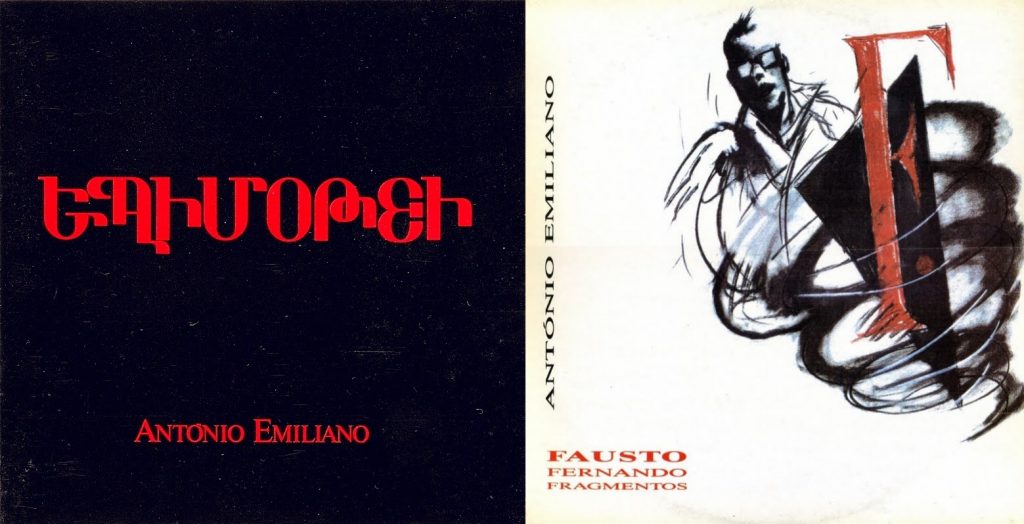António Henrique de Albuquerque Emiliano was born on January 25, 1959, in Lisbon. From an early age he dedicated himself to musical studies and even attended the National Conservatory of Lisbon.
At the age of 17, he abandoned his studies and opted for a more creative musical practice, becoming part of one of the formations of the well-known group Beatnicks. In 1977 and 1978 he studied the first year of the Electrical Engineering Degree at the Instituto Superior Técnico, which he dropped out of and enrolled in the Faculty of Arts at the University of Lisbon.
In 1982, he graduated in Modern Languages and Literatures (Portuguese and English Studies). He was one of the musicians who participated in the album “Sonho Azul” by Né Ladeiras. In 1983 and 1984 he collaborated on several shows performed at Frágil by Anamar and Luís Madureira. In 1985 he produced the album “Em Pessoa” by José Campos e Sousa, with texts by Fernando Pessoa.
It was in that year that he publicly began his musical creation activity by creating the soundtrack for the play “Teatro de Enormidades Apenas Creíveis à Luz Elétrica”, a show based on texts by Aquilino Ribeiro, conceived by Ricardo Pais, Olga Roriz, Luís Madureira and António Emiliano, with scenography and costumes by António Lagarto, for which he received the Critics’ Award for Best Theater Music.
In 1986 he composed the music for the ballet “Espaço Vazio” (choreographed by Olga Roriz), the soundtracks for the films “Repórter X” by José Nascimento (in which he also acts) and “Duma Vez Por Todas” by Joaquim Leitão (for which he later received the Music Award from the Portuguese Institute of Cinema) and also for the play “Anatol” directed by Ricardo Pais. With Nuno Rebelo and Emanuel Ramalho he formed Vors Trans Vekta, which did not last long.
He also produced and arranged the album “Na Vida Real” by Sérgio Godinho, which won the Se7e de Ouro 86 for Popular Music Album. The edition of the soundtrack for the film “Reporter X” by José Nascimento with music by António Emiliano and participation by Anamar, Sérgio Godinho and Rui Reininho was scheduled to be published by Ama Romanta. He received the Critics’ Award for Best Theater Music for the show “Anatol”. In 1987 he composed the music for the ballet “Thirteen Gestures of a Body” by Olga Roriz. He also produced the albums “Aguaceiro” by Lena d’Água and “Negro Fado” by Vitorino. He collaborates with Luís Madureira again.
In 1988 he composed the soundtrack for the film “A Mulher do Próximo” by José Fonseca e Costa and “Voltar” by Joaquim Leitão. “Gahvoreh”, Gagik Ismailian’s first work for the Ballet Gulbenkian, based on original music by António Emiliano, was premiered in July 1988. He was also the author of the soundtrack for the play “FAUSTO. FERNANDO. FRAGMENTOS”, directed by Ricardo Pais for the Teatro Nacional D. Maria II. Receives the special Garrett Award for music. The albums “Fausto Fernando Fragmentos” and “Gahvoreh” were released in 1989 by Transmédia. However, the record company went bankrupt shortly afterwards. He wrote the music for “Ad Vitam”, with choreography by Paulo Ribeiro, and for “Estranhezas”, with choreography by Paula Massano. He received the 1989 Garrett Special Music Award (from the State Secretariat for Culture) for the show “Fausto Fernando Fragmentos” and the 89 Se7e de Ouro for Contemporary Instrumental Music Album for the albums “Gahvoreh” and “Fausto Fernando Fragmentos”.
In 1990 he collaborated again with Joaquim Leitão, in two films from the “Love At First Sight” series, and with José Fonseca e Costa in the film “Os Cornos de Cronos”. He composed the soundtrack for the film “At the End of the Night” (1991) by Joaquim Leitão. He is the author of the semi-opera “Amor de Perdição”, directed by Ricardo Pais and choreographed by Olga Roriz, premiered in November 1991 at the Teatro Nacional de São Carlos. The work was presented at the Théâtre Royal de La Monnaie, in Brussels, on the occasion of Europália 91. In 1993 he produced the track “Matar Saudades” included in the reissue of the album “Banda do Casaco Com Ti Chitas”. He collaborated on the choreography “The Seven Silences of Salome”, premiered in London on the occasion of the reopening of the Savoy Theatre in London. The show received the Time Out Award for best ballet of the year. In 1994 he wrote the soundtrack for the film “Uma Vida Normal”, again by Joaquim Leitão.
On the occasion of the celebrations of the centenary of Infante D. Henrique, he collaborated on the “Miscelânea de Garcia de Resende”, with staging and dramaturgy by Rogério de Carvalho, which was presented at Culturgest. He wrote the soundtrack for “Tragicomedy of D. Duardos”, by Gil Vicente, directed by Ricardo Pais, presented in 1996 at the Teatro Nacional S. João. He suspended his artistic activity in 1996 to dedicate himself exclusively to teaching and research in Linguistics. He resumed his artistic activity in 2005. In 2006 he signed the soundtrack for the film “20.13” by Joaquim Leitão.






António Emiliano nasceu em 25 de janeiro de 1959 em Lisboa; deixou os estudos musicais aos 17 anos para integrar o grupo Beatnicks, formou-se depois em Línguas na Universidade de Lisboa e destacou-se como compositor e produtor, criando trilhas sonoras premiadas para teatro, ballet e cinema, recebendo prémios como o Critics’ Award, o Music Award do Instituto do Cinema, o Garrett Special Music Award e o Se7e de Ouro entre os anos 1985 e 1989
suspendeu a carreira artística em 1996 para se dedicar ao ensino e à investigação em Linguística, regressando em 2005 com música para cinema.